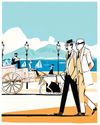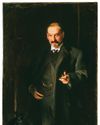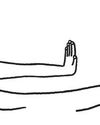
As a boy, Larry McMurtry rode Polecat, a Shetland pony with a mean streak and a habit of dragging him through mesquite thickets. The family ranch occupied a hard, dry, largely featureless corner of north-central Texas, and was perched on a rise known as Idiot Ridge. McMurtry’s three siblings appeared better adapted to their environment—one of his sisters was named rodeo queen; his brother cowboyed for a while—but Larry, the eldest, was afraid of shrubbery, and of poultry. His father, Jeff Mac, ran hundreds of cows, which he knew individually, by their markings; Larry’s eyesight was so poor that he had a hard time spotting a herd on the horizon. When his cowboy uncles were young, they sat on the roof of a barn and watched the last cattle drives set out on the long trek north. McMurtry lay under the ranch-house roof and listened to the hum of the highway, as eighteen-wheelers headed toward Fort Worth, Dallas, or beyond— anywhere bigger, and far away. Many years later, the London-born Simon & Schuster editor Michael Korda, a rodeo enthusiast, wore a Stetson and a bolo tie to his first meeting with McMurtry. He was surprised, and perhaps a bit disappointed, to find the young writer dressed “like a graduate student,” in slacks and a sports coat. “He did not share my enthusiasm for horses, either,” Korda recalled.
This story is from the September 25, 2023 edition of The New Yorker.
Start your 7-day Magzter GOLD free trial to access thousands of curated premium stories, and 9,000+ magazines and newspapers.
Already a subscriber ? Sign In
This story is from the September 25, 2023 edition of The New Yorker.
Start your 7-day Magzter GOLD free trial to access thousands of curated premium stories, and 9,000+ magazines and newspapers.
Already a subscriber? Sign In

BADDIE ISSUES
\"Wicked\" and \"Gladiator II.\"

LET'S MAKE A DEAL
\"Death Becomes Her\" and \"Burnout Paradise.\"

ANTI HEROES
\"The Franchise,\" on HBO.

FELLOW-TRAVELLERS
The surprisingly sunny origins of the Frankfurt School.

NOW YOU SEE ME
John Singer Sargent's strange, slippery portraits of an art dealer's family.

PARIS FRIEND - SHUANG XUETAO
Xiaoguo had a terror of thirst, so he kept a glass of water on the table beside his hospital bed. As soon as it was empty, he asked me to refill it. I wanted to warn him that this was unhealthy - guzzling water all night long puts pressure on the kidneys, and pissing that much couldn't be good for his injury. He was tall, though, so I decided his insides could probably cope.

WILD SIDE
Is Lake Tahoe's bear boom getting out of hand?

GETTING A GRIP
Robots learn to use their hands.

WITHHOLDING SEX FROM MY WIFE
In the wake of [the] election, progressive women, who are outraged over Donald Trump's victory at the ballot box, have taken to social media with public, vengeful vows of chastity. - The Free Press.

DEADLINE EXTENSION
Old age, reborn.